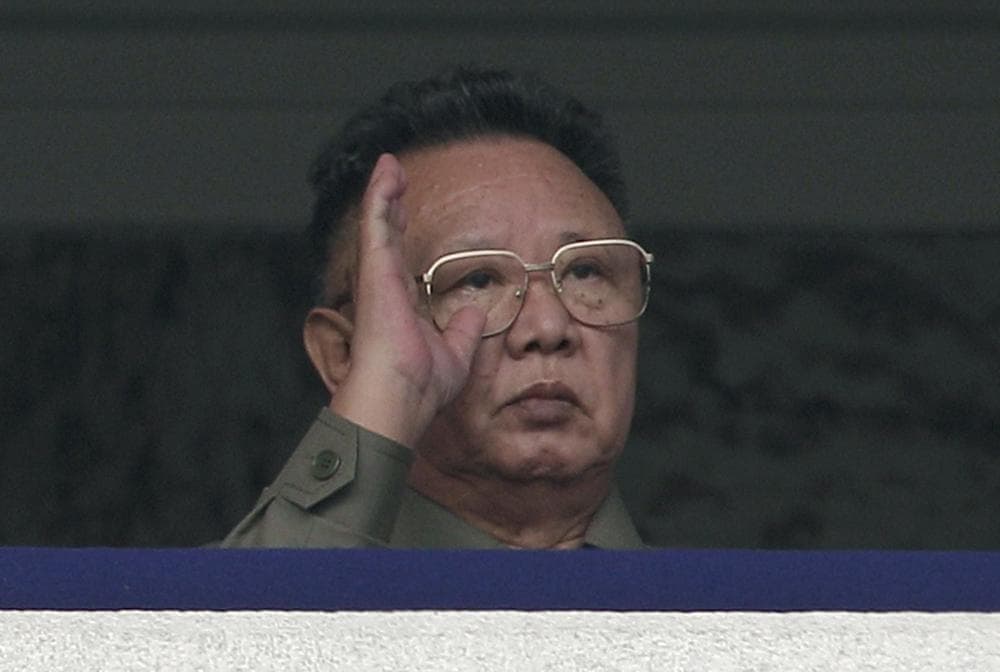Advertisement
What's Next For North Korea
ResumeDeath of a dictator. North Korea’s Kim Jong Il is dead. We’ll look at what’s ahead for his country and the world.

North Korea’s Kim Jong Il took a starving, isolated, paranoid country – his own - and gave it nuclear weapons. But in seventeen years as North Korea’s “Dear Leader” he never really opened the doors to the so-called Hermit Kingdom.
Now we’re told Kim Jong Il is dead. That a maybe thrity-year-old little-known son, Kim Jong Un, is taking over. For many neighbors and beyond, this is frightening news. North Korea works in a reality of its own, but with missiles and nuclear technology that travel the world.
Up next, On Point: death of a dictator and a high-wire changing of the guard in North Korea.
-Tom Ashbrook
Guests
Evan Osnos, China correspondent for The New Yorker.
Stephen Bosworth, Dean of the Fletcher School of Law and Diplomacy at Tufts University, Former Special Envoy to North Korea.
Brian Myers, a researcher of North Korean ideology and propaganda at Dongseo University. He is author of The Cleanest Race: How North Koreans See Themselves—And Why It Matters.
Victor Cha, holds the Korea Chair at the Center for Strategic and International Studies. Professor of government and director of Asian Studies at Georgetown University School of Foreign Service. From 2004 to 2007, he served as director for Asian affairs at the White House on the National Security Council
Highlights
A vulnerable nuclear arsenal is only one threat in the wake of the death of 17-year dictator Kim Jong Il. North Korea’s chief benefactor China, is worried about a failed state on their borders and a refugee crisis.
This time of year, the river between North Korea and China – the principle route for escaping refugees — is frozen and passable. “The leadership in Beijing is huddled up and thinking about what they have to do in order to prevent some sort of immediate collapse,” said Evan Osnos, China correspondent for The New Yorker, based in Beijing.
“There is no other country on the planet right now that has the kind of influence on North Korea that China does,” said Osnos, pointing to the vast aid packages of arms, fuel and food aid, that China has shipped to its precarious client state over the past few decades.
Other North Korea watchers are more bullish on the stability of the state. “I would be surprised if this gets out of control in any serious way,” countered Stephen Bosworth, Dean of the Fletcher School of Law and Diplomacy at Tufts University, Former Special Envoy to North Korea.
“The North Koreans have been planning for this for years.” Bosworth said that 2012 will be an important year for the state, because it is the 100th anniversary of the birth of Kim Il Sung, the father of Kim Jong Il and North Korea’s first leader.
Whatever happens, it is unlikely that state known as the Hermit Kingdom will look to liberalize their ossified economy. “They view the China path as too hazardous, too risky,” Bosworth said. “They understand the importance of economic reform, but to them it poses an unacceptable level of political risk,” Bosworth said.
"The North Koreans are not willing to [like the Chinese leadership] get rich by sacrificing political control," agreed Victor Cha, a North Korea expert at Georgetown University.
Indeed, the staying power of the state may hinge on the power of national propaganda. Brian Myers author of The Cleanest Race: How North Koreans See Themselves—And Why It Matters, said that the North Korean self-narrative is one of extreme race-based nationalism, reminiscent of the fascism of the 1930s.
"Psychologically, that's a very appealing doctrine because it is just as adopted to bad economic times as to good ones," Myers said. "When things go badly, you just blame the outsiders."
From Tom's Reading List
Time Magazine "(PYONGYANG, North Korea) — North Korea announced the death of supreme leader Kim Jong Il and urged its people Monday to rally behind his young son and heir-apparent, while the world watched for signs of instability in a nation pursuing nuclear weapons.
New York Times "SEOUL, South Korea — Kim Jong-il, the North Korean leader who realized his family’s dream of turning his starving country into a minor nuclear-weapons power even as the isolated nation sank further into despotism, died on Saturday of a heart attack, according to the country’s state-run media."
Washington Post "Kim Jong Il, the strangely antic and utterly ruthless heir to North Korea’s Stalinist dictatorship, died of an apparent heart attack Saturday, state media reported Monday. He was said to be 69."
This program aired on December 19, 2011.
